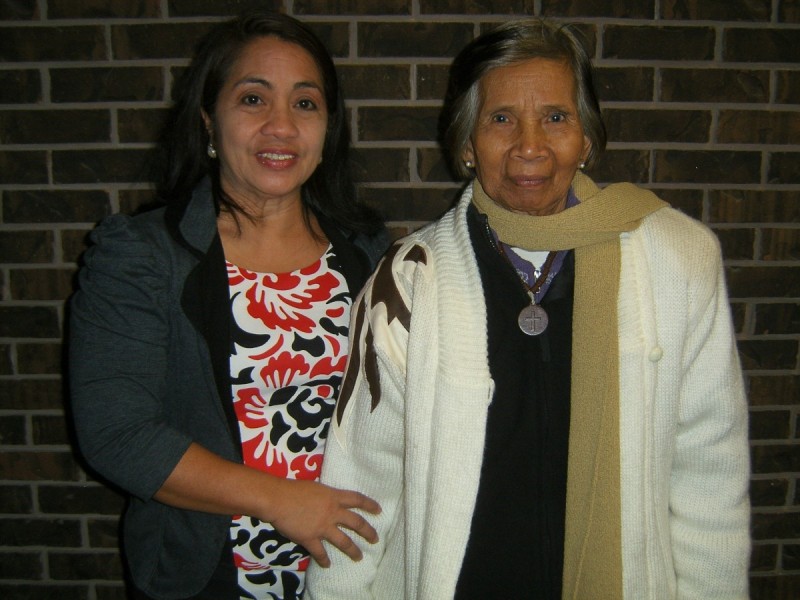
A therapeutic drawing by former Filipino "comfort woman", it depicts soldiers with guns and the aftermath of bombing. (Photo courtesy of Cristina Lope Rosello)
Comforting war’s ‘comfort women’
The soldiers who raped teenager Lola Fidencia David probably expected her to end her life in shame and silence.
But on Oct. 18, the diminutive 86-year-old stood in front of University of Manitoba students with her fist raised, reciting by heart a poem dedicated to Filipino “comfort women.” Japanese soldiers systematically raped them during the Second World War to demoralize brothers, fathers and neighbours in the Filipino resistance.
“Let us fight for the rights of women,” David cried defiantly in Tagalog, after tearing up telling the story of her childhood.
One day David was a 14-year-old carrying fruits and vegetables in a basket on her head to market. A couple of weeks later, her father found her sobbing in a rice field. David’s grandmother was dead, her home was burned to the ground and she had been raped countless times.
As many as 200,000 Asian women were sex slaves for Japanese soldiers, many in military brothels. David wants an apology from the Japanese government and compensation for those few comfort women who are still alive.
David’s therapist, Cristina Lope Rosello, accompanied the elderly woman from Manila at the invitation of Winnipeg’s Canadian Museum for Human Rights and Chinese Cultural and Community Centre. Rosello says restorative justice needs to include rehabilitation. She asks former comfort women to draw a garden while they’re in a relaxed state. The gardens end up full of soldiers and bombs, giving the women an opening to start telling their stories after 50 years of silence.
Rosello also helped push the International Criminal Court to recognize wartime rape as a crime.
U of M history professor Dr. Joyce Chadya, another speaker at the Robson Hall event, has interviewed Zimbabwean women sexually abused by fellow combatants in the 1970s war, as well as rural girls and young women sexually abused by both Rhodesian and nationalist forces. Most of the women have never told their husbands or children, maintaining the self-censorship that began when their fathers averted their eyes.
“What was the point of knowing what was going on and not being able to stop it?” one father said.
War veterans were outraged by a rape scene in the 1996 movie Flame that they claimed was “full of lies,” but it became the most watched movie in Zimbabwe that year.
“A society that denies the truth cannot move forward,” one of Chadya’s informants said.
Fellow history professor Dr. Tina Chen said the Chinese government has never let citizens forget the rape of Chinese women by Japanese invaders. In fact, that theme turns up in almost every film officials send out monthly to villagers – and in The Flowers of War, China’s entry for the 2011 Oscars.
Chen said the Chinese Communist Party uses freeing women from violation by foreigners to justify its own rule.
“Speaking about sexual violence perpetrated in the anti-Japanese war is often a way of silencing other forms of criticism and protest.”
The panel discussion was part of the free, public seminar series Critical Conversations on Sexual and Reproductive Rights organized by the University of Manitoba’s Centre for Human Rights Research. Future topics include research on sexually transmitted infections, sex work and workplace harassment.







